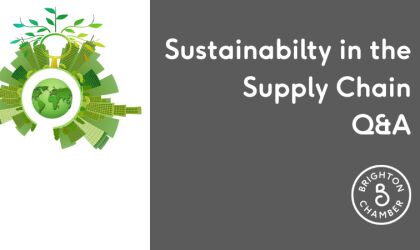
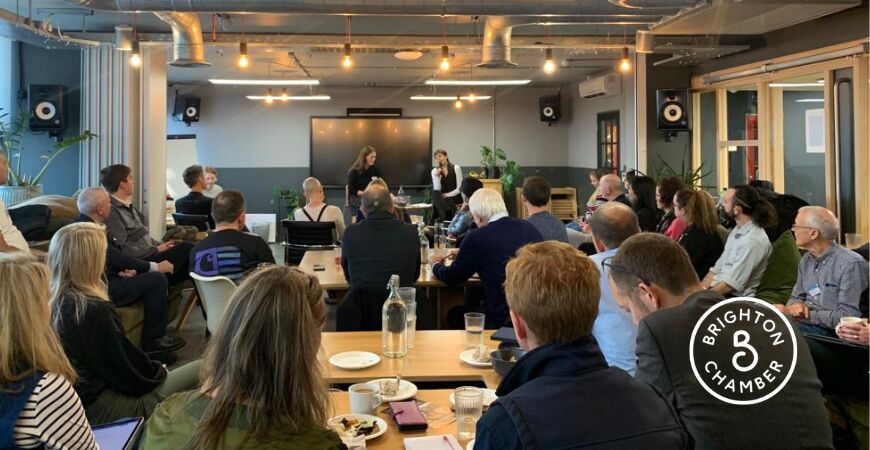
Wed 21 / 12 / 22
When the Net Zero Champions met Caroline Lucas
Britain’s first Green Party MP Caroline Lucas joined Brighton & Hove’s Net Zero Champions to answer questions and hear how to support businesses helping decarbonise our economy.
By Vicky Welstead of
First elected in 2010 and co-leader of the Green Party from 2016 to 2018, Caroline Lucas has chaired All Party Parliamentary Groups on Climate Change and Limits to Growth and is now Deputy Chair of the APPG on Renewable and Sustainable Energy. Closer to home she is a Martlets patron and topped Woman’s Hour’s Power List for the Planet in 2020.
On Friday 2nd December more than 50 Net Zero Champions and members of the business community joined the Q&A and discussed how to accelerate progress. The interview was facilitated by Emma Mills-Sheffield of Mindsetup Ltd, here’s a snapshot of the conversation:
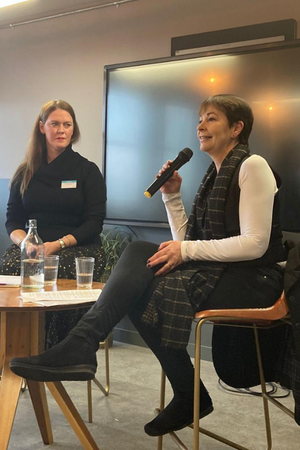
What drew you to politics in the first place?
“Back in the days of Greenham Common there was this very real threat of nuclear war. The anti-nuclear movement got me into politics and reading Jonathan Porritt’s book Seeing Green put it into a political package for me. I marched down Clapham High Street to join the Green Party, or the Ecology Party as it was then, looking for a big building with a plaque on the wall, only to find a boxroom above a Chinese restaurant.”
What can be done to encourage people into politics?
“Clean the damn thing up! It would be incredibly difficult right now to persuade people into politics. On one hand it can feel like a soap opera, like what’s Matt Hancock done next? Or much more seriously what we heard about fraud related to PPE. All that can’t be left unchecked.
“There’s a culture of lies and hypocrisy which is deeply depressing. So clean that up. And change the voting system. Of course I would say that, as a smaller party, but it’s also important because we need to strengthen the link between people and politics. In many constituencies it takes a lot to persuade people to vote because it’s a safe seat.
“I also think we should have job-sharing MPs. In every sector where job sharing is now successful people originally said it won’t work here. If we want more diversity in politics that’s a way to achieve it.”
How can we persuade the Government to have a proper windfall tax?
“Even BP’s chief finance officer says BP’s got more money than it knows what to do with, yet our windfall tax has a massive loophole. If a company says they’ll reinvest profits into oil and gas extraction they hardly pay anything. So despite the Glasgow COP agreeing to stop incentivising fossil fuels eg through subsidies, the Government has just introduced this new perverse incentive.
“We need to shame the Government at every step. Telling everyone how they’re giving billions to oil and gas companies. It’s bonkers.”
What would you replace the House of Lords with?
“Actually ironically I think it’s doing a better job of scrutinising and challenging Government legislation than the Commons right now. At least they’re doing something to temper these awful bills trying to outlaw protesting and making voting more difficult. But it’s true the Green Party would replace it with a fully elected Upper House using proportional representation. Within the House of Lords there is a lot of expertise from people from many different backgrounds, and I wonder if we could have a system of chapters, bringing that knowledge together. I’m anxious we don’t just replicate the problems of the House of Commons.”
How can cities do more to achieve net zero?
“Much of what cities can do depends on what’s allowed nationally – we live in one of the most centralised countries in Europe. There’s fantastic work going on. But if we have more devolution so much more could be done. We’ve listened to Andy Burnham on what he’s achieved with trams and more affordable electric buses, but that’s only because, as Manchester’s Mayor, he’s been given powers to take back control. All local authorities should have the powers to be able to make the changes we need.
If I look to Europe I can see exciting projects to achieve Net Zero left, right and centre. Not because they’re any more creative or any more committed, but because they’ve got a facilitating national framework that allows that leg up. We’re never going to level up from Westminster – we need more local control.”
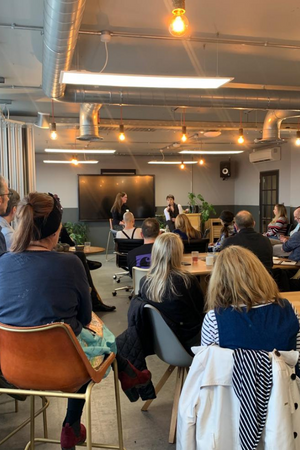
How do you feel about COP?
“I am very glad the so-called loss and damage fund was finalised. Richer countries have been, to date, responsible for the majority of climate emissions. Whereas countries, for example Dominica, have had two hurricanes that between them cost 250% of their GDP. So it’s good we have the principle now, but the money still has to be found. The fantastic Mia Mottley, Prime Minister of Barbados, has come up with many creative ideas on how you can fill that pot. Getting help from international financial organisations, or a tax on fossil fuels, or a tax on aviation.
“But I haven’t even got to talking about 1.5 °C! The bad news from COP is that there wasn’t more ambition when it comes to reduction targets, including from our own Government.”
If we’re going to hit 1.5, how can Brighton be part of the solution, not the problem?
“By accelerating things we’re already doing. Shout out to Sophie [Moss from Brighton & Hove City Council]. I think we’re one of the few local authorities with a circular economy officer. But we need more finance and a better national framework.
“One of the frustrations is we all know what to do, and the technology exists to do it. On waste, on energy, on food, on transport. What’s lacking is a joined up way of facilitating it.
“Much comes down to what’s allowed in terms of rules and contracts. If you sign up to a stupid PFI contract, it’s not surprising the terms of that contract 20 years on are not what you need now. When Michael Gove was Environment Secretary I raised it with him, saying we would love to extend our recycling in Brighton, but if we break the terms of the contract it’s going to cost several million pounds, so what can we do? To which there was no real answer.
“To their credit all three local MPs have been meeting with our waste partner, Veolia. But before they make any improvements to the waste system, they want to wait for the Government to come up with a whole set of new targets. They were due to be published at the end of October and still haven’t been. So from Veolia’s point of view they can’t upgrade their plant until they know the targets and the council can’t do much until they know how much money will come from DEFRA. So we’re in this frustrating limbo.
“Only three people are working on these targets at DEFRA, there’s just not the capacity. At the same time we’ve got the so-called Brexit bonfires bill – which means DEFRA is supposed to be reviewing 500 pieces of regulation, and if they don’t do it by the end of 2023 all that legislation will just fall. That’s habitats, bathing waters, pesticides. Really important legislation.”
So how can we fight back?
“Have a positive vision. For example I’ve been talking to people connecting corridors of rewilded land together. Then you look at what’s going on at Knepp and its Weald to Waves project. If we can sell a vision of Brighton & Hove being surrounded by all this connected, restored nature I think that would really excite people.”
What can micro businesses do to reduce their impact?
“The first step I would take is reviewing where your electricity is coming from. If it’s from a company with no green credentials then switch. Or look at where your pensions fund is going. Who are you banking with? Right now small businesses are struggling. It’s a difficult time for big environmental investments, but some of those things would have a big impact without much cost.”
There’s some great things happening with hydrogen systems, but how can we make it go faster?
“The Government has finally come up with a strategy on hydrogen but it’s not joined up. There’s a distinction between green and blue hydrogen, but they haven’t suggested what should be the balance between the two. Unsurprisingly I think we need much more green hydrogen, which has consequences for renewable energy, so they need to sort themselves out with onshore wind.
“These mixed messages make things difficult for investors. We need a more coherent strategy around green hydrogen and a stronger sense of its contribution towards decarbonising our energy system. Fossil fuel companies are quite happy with blue hydrogen because they can leave all their infrastructure in place, even though some calculations say blue hydrogen can, because of methane, be even worse than fossil fuels.”
After the Q&A the event opened into a general discussion on the challenges facing those working to build a greener economy and what can be done to remove barriers. Here are some key points:
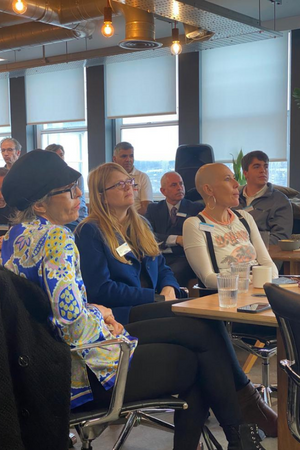
Harriet Dean-Orange, founder of Harriets of Hove:
“In the last few months five zero waste shops have shut across the city. Brighton & Hove used to be known for refilling. Now there’s only a couple of us left and we’re struggling.
“We’re in unfit properties, haemorrhaging money. I feel like I’m the only one in Hove struggling to lower people’s waste. Can we stop obsessing about recycling and do more about the circular economy? What we need to do is stop creating the waste in the first place. The council has been very helpful to me, but if we want other local businesses to become carbon neutral we need to showcase the ones that are already doing it.”
Sarah Spingford, CEO of Brighton Chamber:
“There isn’t much support for businesses starting out anymore, and we’ve seen how well people do when they get that support. But I agree one simple practical thing we could ask from the council is to promote these businesses. There’s a feeling we can’t promote anything from the private sector, but actually we’re not talking about bad business. We’re talking about amazing small businesses that have filled the gap in Brighton.”
Luke Bray, Partner at Axiom Architects:
“Since joining the Chamber a year ago much of our efforts to improve our circularity has been about connecting with other businesses. It’s about finding those connections where one person’s waste is another person’s produce. We need to make these circles smaller and more local.”
Sandra Staufer, from Sandra Staufer Illustration:
“Government needs to do something about the lifetime of a product, because if we want to reduce waste we need to produce better products. My mother had a washing machine that lasted sixty years and the company that made it went bust. It’s not fair that businesses producing that kind of quality aren’t winning.”
Vicky Welstead is Associate Director at Fugu PR, a public relations and communications consultancy.
Thanks to Emma Mills-Sheffield from Mindsetup for chairing the conversation, Platf9rm for hosting, and The Real Junk Food Project for refreshments.
Brighton Chamber’s Net Zero Champions are the people in business who are driving the journey to Net Zero. If you’d like to find out more about our Net Zero Champions, and how to join the group, visit our Net Zero page. We’re planning more events, support and signposting to help your business with Net Zero in 2023. Sign up to our mailing list for the latest updates.
If you want to contribute to the Chamber blog, contact us on hannah@brightonchamber.co.uk



